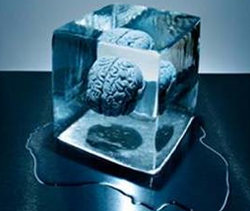 Therapeutic hypothermia - Here we go again. Another quite invasive therapy we offered to patients in the last couple of years might actually not help as we thought it would. This seems to become another deja-vu and might just show the saying which is so true for intensive care: ‘Less is more’. Just last month the New England Journal of Medicine published this international multi-center trial where 950 patient initially were enrolled to receive hypothermic treatment at 33°C or 36°C. 939 patients finally where followed up for neurologic function (CPC scale and Rankin scale) and death. And guess what... There is no difference what so ever! The evidence of this study implicates that therapeutic hypothermia might not be of any benefit. So what do we do now? Is this the end of the hypothermic era? Nielsen N, et al. New Engl J Med. 2013 Dec;369(23):2197-206  Hypothermia is back in the focus of discussions and was not only used for treatment after cardiac arrest. If hypothermia would protect after cerebral ischemia after an arrest it might be also useful after other impacts like stroke or meningitis. To answer this question a french multi-center study was started involving 49 intensive care units. Patients with communitiy acquired bacterial meningitis and a GCS of less than 8 for less than 12 hours were enroled. The hypothermia group was cooled to 32-34°C for 48 hours and then passively rewarmed. Primary outcome was GCS at three months. After including 98 patients the study had to be stopped on the request of the data ans safety monitoring board due to concerns over excess mortality in the hypothermia group. Analysis showed no improve of outcome but might actually be harmful to patients. Hypothermia doesn’t seem to be the magic bullet here either. Mourvillier B, et al. JAMA. 2013 Nov;310(20):2174-83 |
Search
|


 RSS Feed
RSS Feed


